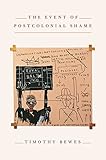The Event of Postcolonial Shame / Timothy Bewes.
Material type: TextSeries: Translation/Transnation ; 26Publisher: Princeton, NJ : Princeton University Press, [2010]Copyright date: ©2011Edition: Course BookDescription: 1 online resource (240 p.) : 6 halftonesContent type:
TextSeries: Translation/Transnation ; 26Publisher: Princeton, NJ : Princeton University Press, [2010]Copyright date: ©2011Edition: Course BookDescription: 1 online resource (240 p.) : 6 halftonesContent type: - 9780691141664
- 9781400836499
- Commonwealth literature (English) -- History and criticism
- LITERARY CRITICISM -- Semiotics & -- Theory
- LITERARY CRITICISM -- European -- English, Irish, Scottish, Welsh
- Postcolonialism in literature
- LITERARY CRITICISM / Semiotics & Theory
- Act of Violence
- Alain Badiou
- Alterity
- Antithesis
- Autobiography
- Being and Nothingness
- Caryl Phillips
- Colonialism
- Conceptualization (information science)
- Conscience
- Consciousness
- Criticism
- Critique
- Culture and Imperialism
- Cynicism (contemporary)
- Decolonization
- Dialectic
- Diegesis
- Disenchantment
- Disgrace
- Disgust
- Dusklands
- Edward Said
- Emblem
- Essay
- Ethics
- Exclusion
- Explanation
- Fiction
- Frantz Fanon
- Franz Kafka
- G. (novel)
- Gilles Deleuze
- Giorgio Agamben
- Henri Bergson
- Humiliation
- Ideology
- Impossibility
- In the Heart of the Country
- Inseparability
- Irony
- J. M. Coetzee
- Jean-Paul Sartre
- Joseph Conrad
- Kurtz (Heart of Darkness)
- Lag
- Literature
- Lord Jim
- Michel Leiris
- Minima Moralia
- Modernity
- Mrs
- Nadine Gordimer
- Narration
- Narrative
- Novelist
- Objectivity (philosophy)
- Ontology
- Pathos
- Pessimism
- Peter Hallward
- Phenomenon
- Philosopher
- Philosophy
- Pier Paolo Pasolini
- Poetry
- Politics
- Positivism
- Postmodernism
- Potentiality and actuality
- Primo Levi
- Principle
- Publication
- Racism
- Result
- Rhetoric
- Samuel Beckett
- Self-hatred
- Seven Pillars of Wisdom
- Shame
- Slavery
- Slow Man
- Subaltern (postcolonialism)
- Subjectivity
- Suggestion
- Superiority (short story)
- Symptom
- T. E. Lawrence
- Temporality
- The Other Hand
- The Philosopher
- The Wretched of the Earth
- Theodor W. Adorno
- Theory of Forms
- Theory
- Thought
- V. S. Naipaul
- Vocation (poem)
- Writer
- Writing
- 820.9/3581 22
- PR9080 .B49 2011eb
- online - DeGruyter
| Item type | Current library | Call number | URL | Status | Notes | Barcode | |
|---|---|---|---|---|---|---|---|
 eBook
eBook
|
Biblioteca "Angelicum" Pont. Univ. S.Tommaso d'Aquino Nuvola online | online - DeGruyter (Browse shelf(Opens below)) | Online access | Not for loan (Accesso limitato) | Accesso per gli utenti autorizzati / Access for authorized users | (dgr)9781400836499 |
Frontmatter -- Contents -- Acknowledgments -- Prologue -- Part One. The Form of Shame -- Part Two. The Time of Shame -- Part Three. The Event of Shame -- Notes -- Index -- Backmatter
restricted access online access with authorization star
http://purl.org/coar/access_right/c_16ec
In a postcolonial world, where structures of power, hierarchy, and domination operate on a global scale, writers face an ethical and aesthetic dilemma: How to write without contributing to the inscription of inequality? How to process the colonial past without reverting to a pathology of self-disgust? Can literature ever be free of the shame of the postcolonial epoch--ever be truly postcolonial? As disparities of power seem only to be increasing, such questions are more urgent than ever. In this book, Timothy Bewes argues that shame is a dominant temperament in twentieth-century literature, and the key to understanding the ethics and aesthetics of the contemporary world. Drawing on thinkers such as Jean-Paul Sartre, Frantz Fanon, Theodor Adorno, and Gilles Deleuze, Bewes argues that in literature there is an "event" of shame that brings together these ethical and aesthetic tensions. Reading works by J. M. Coetzee, Joseph Conrad, Nadine Gordimer, V. S. Naipaul, Caryl Phillips, Ngugi wa Thiong'o, and Zoë Wicomb, Bewes presents a startling theory: the practices of postcolonial literature depend upon and repeat the same structures of thought and perception that made colonialism possible in the first place. As long as those structures remain in place, literature and critical thinking will remain steeped in shame. Offering a new mode of postcolonial reading, The Event of Postcolonial Shame demands a literature and a criticism that acknowledge their own ethical deficiency without seeking absolution from it.
Mode of access: Internet via World Wide Web.
In English.
Description based on online resource; title from PDF title page (publisher's Web site, viewed 27. Jan 2023)


